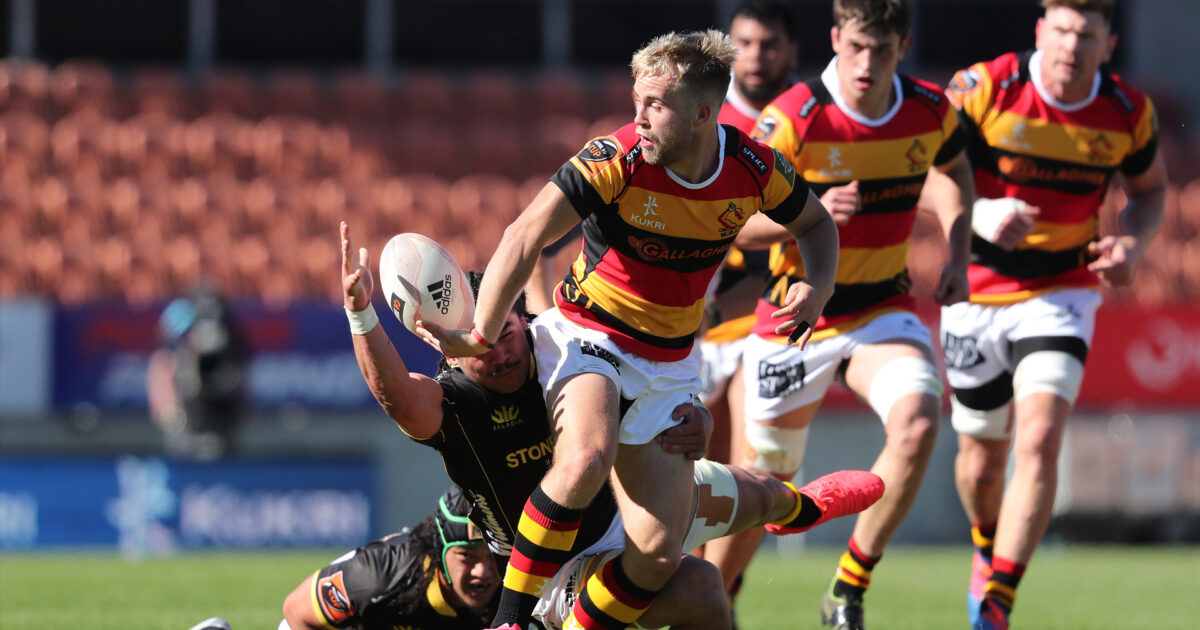The superstar 21-year-old scrumhalf that outplayed TJ Perenara in just his second provincial start

Wellington, with their starting XV laden with Super Rugby experience and three All Blacks in the form of Asafo Aumua, Ardie Savea and TJ Perenara, were expected to have too much firepower for Waikato in their opening match of the provincial season.
While Aumua, Savea and Perenara added plenty of joie de vivre to Wellington’s attack – and played major roles in the Lions’ four tries, they weren’t able to keep Waikato’s counter-attack in check and ultimately succumbed 53-28.
In fact, it was Perenara’s opposite, 21-year-old Xavier Roe, who sparked the home side to their highest ever score against Wellington.
Roe, who boarded at Hamilton Boys’ High School but spent the first two years of his provincial career with Taranaki, was starting just his second provincial match.
In 2018 and 2019, Roe accrued just six matches for the Bulls. His solitary start ironically came in an unsuccessful Ranfurly Shield defence against Waikato in his second game for Taranaki. After two seasons in New Plymouth, Roe has now made the move back to Hamilton and despite having just a handful of caps to his name, is the senior halfback in the squad.
His one-two combination with fellow youngster Cortez Ratima could blossom into something exceptional for the Mooloos, especially if Roe’s showing on Saturday is anything to go by.
The 2018 New Zealand Under 20s representative let Wellington know in the 15th minute that although he was playing in his Waikato debut, he wasn’t going to go into his shell. With Waikato on attack five metres out from the try-line and five metres in from the sideline, Roe threw a dummy pass towards Damian McKenzie on the wing then scooted between Vince Aso and Connor Garden-Bachop to score his side’s first try of the afternoon.
The little halfback then made the most of a penalty advantage – thanks to Perenara rushing up offside – to dab through a perfectly weighted kick for Adam Thomson to touch down shortly after halftime.
38 and still got it ?????#WAIvWEL pic.twitter.com/CbUbOyINj7
— Bunnings NPC (@BunningsNPC) September 12, 2020
That’s not to suggest that Perenara didn’t also stamp his influence on the game. The 65-test All Black threw the final pass for two of Wellington’s four tries and tried his best to get under the Waikato players’ skin with a few choice comments. It was also his slightly dodgy pass that McKenzie pounced on to run almost 100 metres and score the decisive blow, however.
Roe, on the other hand, had not a black mark against his name. His running game caused plenty of problems for Wellington, he mixed up his play well to keep the opposition guessing, and his delivery of the ball was reliable enough – though the speed and accuracy of his pass will likely be a work-on for the 21-year-old, as it is for all young halfbacks.
With Roe one of just two scrumhalves in the Waikato squad, ample minutes should be on offer throughout the competition and could pave the way for higher honours.
All Blacks Brad Weber and Te Toiroa Tahuriorangi are both on the Chiefs’ books for next year but there’s certainly space for a young man like Roe to join the team. He’ll likely be competing for the berth with this year’s third-choice at the Chiefs, Lisati Milo-Harris – who was preferred ahead of Roe at Taranaki last season. Bay of Plenty’s Leroy Carter and Roe’s teammate Ratima are the other possibilities – if Warren Gatland and Clayton McMillan want to focus their attentions on the Chiefs traditional catchment area.
"Whenever you got pulled into Tana’s office just by yourself, usually it wasn’t great news."
In 2016, Bryn Hall was dropped by the Blues. A year later, he was a #SuperRugby winner. The @CrusadersRugby halfback spoke to @TomVinicombe about his move south.https://t.co/0fVJkgSgsf
— RugbyPass (@RugbyPass) August 30, 2020
While it’s obviously early days in the Mitre 10 Cup, Roe’s promise from his time with the New Zealand Under 20s and other age-grade sides, combined with the way he performed against one of the competition’s title-favourites, suggests that Waikato could have a future superstar on their hands.
The 2006 provincial winners have struggled for continuity in the halfback role over the last decade. Tawera Kerr-Barlow was a standout for the side when available but was often occupied by All Blacks commitments while Brad Weber was exceptional in his three seasons with the team before relocating to Hawke’s Bay.
Jack Stratton, a former Cantabrian, showed promise over the past two seasons but has now set up shop in Japan. Meanwhile, the likes of Kylem O’Donnell, Raniera Takarangi and Harrison Levien all spent time in the squad but never nailed down a spot.
The Roe and Ratima combination – although inexperienced – possesses immense potential and the competition between two of New Zealand’s most promising halfbacks should hopefully bring out the best in both of them.
Further down the line, the All Blacks have three relatively ageing halves on the ledger and opportunities will certainly come calling in the future.
For now, however, Roe just needs to string together a run of assured performances. TJ Perenara was possibly as big a challenge as one could ask for but there are plenty of talented and experienced halfbacks running around in the Mitre 10 cup who will put pressure on Waikato’s first choice. The challenges won’t get any easier for Roe with Crusader Bryn Hall on the agenda next weekend. There’s simply no better way of improving, however, than going up against the best-of-the-best week-in and week-out.
That’s the beauty of New Zealand’s provincial competition.

























